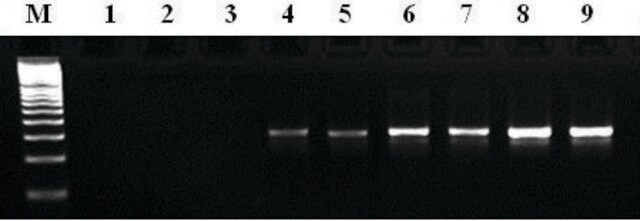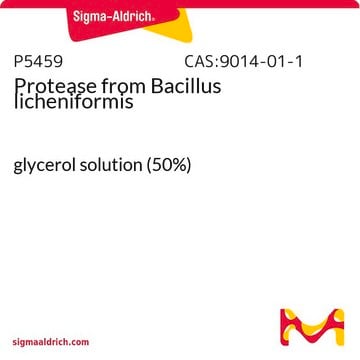11480022001
Roche
Tth DNA Polymerase
pkg of 500 U (2 x 250_U), sufficient for ≤200 reactions
Sinônimo(s):
DNA polymerase, polymerase
About This Item
Produtos recomendados
fonte biológica
bacterial (Thermus thermophilus)
Nível de qualidade
recombinante
expressed in E. coli
forma
liquid
uso
sufficient for ≤200 reactions
atividade específica
5 U/μL
embalagem
pkg of 500 U (2 x 250_U)
fabricante/nome comercial
Roche
concentração
0.5-5.0 units (per reaction for PCR (standard))
2.5 units (per reaction for PCR (standard))
Parâmetros
75 °C optimum reaction temp.
técnica(s)
PCR: suitable
RT-PCR: suitable
nucleic acid labeling: suitable
cor
colorless
pH ideal
~9.0 (25 °C)
solubilidade
water: miscible
adequação
suitable for molecular biology
nº de adesão UniProt
aplicação(ões)
life science and biopharma
atividade externa
Endonuclease, none detected (up to 20 enzyme units using Lambda-DNA/ 16h/37°C)
Nicking activity, none detected ( up to 20 enzyme units using pBR322-DNA / 16h/37°C)
RNases, none detected (up to 20 enzyme units using MS II-RNA; 4h/37°C)
temperatura de armazenamento
−20°C
Categorias relacionadas
Descrição geral
Aplicação
- to amplify DNA fragments by polymerase chain reaction (PCR) due to its resistance towards prolonged incubations at high temperatures (95 °C)
- to label DNA fragments with either radiolabeled nucleotides, digoxigenin, or biotin, since this enzyme accepts modified deoxyribonucleotides as substrates
- to efficiently transcribe RNA targets into cDNA due to its intrinsic Mn-dependent reverse transcriptase (RT) activity
- for real time PCR
Ações bioquímicas/fisiológicas
Características e benefícios
- Ensures optimized polymerase chain reaction (PCR) product size for at least up to 1,000 bp in a RT-PCR reaction
- Accepts modified desoxyribonucleoside triphosphates as substrates
- Has no association with RNase H activity
- Has high thermostability to overcome the problem, typically associated with the high degree of secondary structure present in RNA
Embalagem
Qualidade
Definição da unidade
Unit Assay: Incubation buffer for assay on activated DNA
67 mM Tris-HCI, pH 8.8 (+25 °C), 16.6 mM (NH4)2SO4, 6.7 mM MgCl2, 10 mM 2-mercaptoethanol, 0.2 mM dATP, dCTP, dGTP, dTTP each.
Incubation procedure
12.5 μg activated herring sperm DNA and 0.1 μCi [α32P] dCTP are incubated with 0.01 to 0.1 units Tth DNA Polymerase in 50 μl Incubation buffer with a paraffin oil overlay at +70 °C for 30 min.
The amount of incorporated dNTPs is determined by trichloroacetic acid precipitation followed by scintillation counting.
Volume Activity: 0.5 to 5 U per reaction of PCR (optimal)
2.5 U per reaction of PCR (standard)
Determined in the assay on activated DNA described under "unit assay".
Outras notas
Informações legais
Somente componentes do kit
- PCR Buffer, including MgCl2 10x concentrated
- RT-PCR Buffer, coupled reaction in one tube 5x concentrated
- Mn(OAc)2-Solution 25 mM
Código de classe de armazenamento
12 - Non Combustible Liquids
Classe de risco de água (WGK)
WGK 1
Ponto de fulgor (°F)
does not flash
Ponto de fulgor (°C)
does not flash
Certificados de análise (COA)
Busque Certificados de análise (COA) digitando o Número do Lote do produto. Os números de lote e remessa podem ser encontrados no rótulo de um produto após a palavra “Lot” ou “Batch”.
Já possui este produto?
Encontre a documentação dos produtos que você adquiriu recentemente na biblioteca de documentos.
Os clientes também visualizaram
Nossa equipe de cientistas tem experiência em todas as áreas de pesquisa, incluindo Life Sciences, ciência de materiais, síntese química, cromatografia, química analítica e muitas outras.
Entre em contato com a assistência técnica









